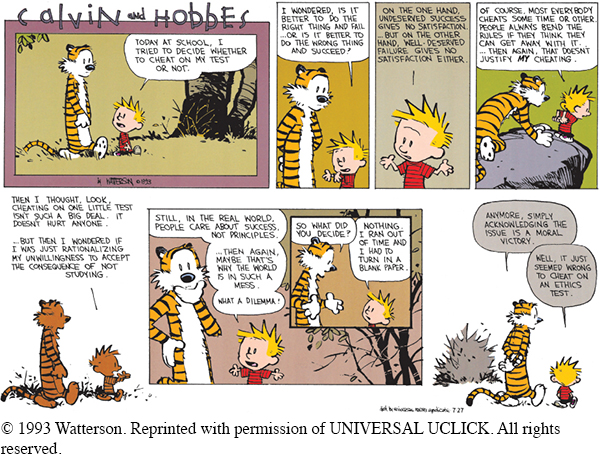7.14 CONVERSATION
THE CHEATING CULTURE
“The Josephson Institute Center for Youth Ethics surveyed 43,000 high school students in public and private schools and found that:
59 percent of high school students admitted cheating on a test during the last year. 34 percent self-
reported doing it more than two times. One out of three high school students admitted that they used the Internet to plagiarize an assignment.
Based upon these results, it’s very likely that someone sitting on either side of you in your class right now has cheated this year, maybe even you. It would be a mistake, however, to think that cheating is only something that happens in school. If you spend any time following the news, you’d notice that cheating seems pretty widespread in a wide variety of aspects of life. Look at this list of a few recent examples:
Sports: Cyclist Lance Armstrong was stripped of his Tour de France titles after admitting to cheating by using banned substances. Major League Baseball stars Barry Bonds, Mark McGwire, Sammy Sosa, Rafael Palmeiro, Jason Giambi, and many others have been implicated in so many steroid scandals that the entire period of baseball in the 1990s and early 2000s is now called “the steroid era,” during which few records are considered valid. In football, New England Patriots head coach Bill Belichick was caught videotaping the New York Jets’ defensive signals. National Basketball Association referee Tim Donaghy was convicted of intentionally missing foul calls or making incorrect ones in order to win bets and was sentenced to fifteen months in prison.
 © 1993 Watterson. Reprinted with permission of UNIVERSAL UCLICK. All rights reserved.Page 480
© 1993 Watterson. Reprinted with permission of UNIVERSAL UCLICK. All rights reserved.Page 480Education: In the Atlanta public schools, several teachers, test coordinators, and administrators, were convicted in 2015 for participating in a massive cheating scandal in which adults regularly changed the students’ responses on standardized exams. According to a study released by the U.S. Government Accountability Office in May 2013, “Officials in 40 states reported allegations of cheating in the past two school years, and officials in 33 states confirmed at least one instance of cheating. Further, 32 states reported that they canceled, invalidated, or nullified test scores as a result of cheating.”
Business: Bernie Madoff, the founder of a popular Wall Street investment firm, was arrested in 2008 after authorities were informed that his whole operation was a fraud; his investors’ losses totaled an estimated $64.8 billion. Madoff was sentenced to 150 years in jail. When U.S. energy company Enron went bankrupt in 2001, several high-
level executives were convicted of corporate fraud and cheating individual customers. Politics: In 2011, former Illinois governor Rod Blagojevich was convicted for a number of crimes, including his efforts to “sell” President Obama’s vacant U.S. Senate seat to the highest bidder. In 2013, former U.S. representative Jesse Jackson Jr., who had resigned after being investigated by the FBI, admitted to using campaign funds to make personal purchases.
Relationships: Not a day goes by without a tabloid magazine reporting that one celebrity has cheated on his or her spouse or partner with yet another celebrity. And according to the New York Times, which in 2008 cited a National Science Foundation study, “In any given year, about 10 percent of married people—
12 percent of men and 7 percent of women— say that they have had sex outside their marriage.”
Is cheating really so widespread, or is it just sensationalized when it’s discovered because it makes for good news stories? Is cheating always wrong, or can there be situations in which it might be acceptable? Is there a clear agreement on what actually defines cheating? In this Conversation, you will read about cheating in sports, school, the workplace—